HIS TEMPTATION
by Jeremy Chance Springfield
10/29/16

Not a single human goes through this life without facing temptation. It comes upon us in ways we cannot always control, and many times, from unexpected avenues. The power of temptation may seem light in one instance, and overwhelming in another, but the danger behind it is all the same: failure to live with integrity before the Presence of the Holy One. For every victory there seems a defeat, and the believer can become weighed down with the burden of past embarrassments. There is no hope to be found in ourselves. The human condition is that of condemnation: the will is impotent to resist evil at every turn, and sooner or later, our fealty to the Father will be shown inadequate in some degree. With nowhere to turn, despair is sure to fall with deadly force.

Thankfully, a sure hope exists for us: the Messiah Yeshua has overcome all temptation through a life lived at every passing second in resistance to succumbing to sin, and His victory can be reckoned upon our lineage and life experiences to override our failures before the Holy One! Scripture calls us to note the triumphant nature of Yeshua’s life as hope for our own giving in to temptations. It is discussed in the book of Hebrews, which is a very complex and yet illuminating book that discusses the superiority of Messiah’s priestly ministry over the Levitical ministry. Both are valid callings in the Kingdom of the heaven, but Messiah’s authoritative and overarching office of High Priest contains in it a detail not present in the fallible men who are touched with the same failures as we know so well. Hebrews 4:15 discusses the great hope we have in Messiah’s experience with and overcoming of temptation as our Heavenly High Priest.
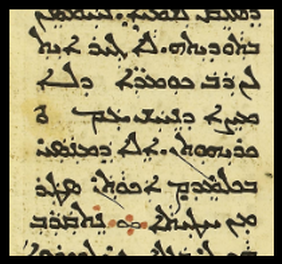
For there is not for us a High Priest who is unable to suffer with our weakness, but rather, He was tempted in every thing like us - apart from sin.

The text yields a surprising and relevant truth: Messiah’s life experience was just like ours: temptation was known to Him in every facet as it has been to us, but with a totally different end result – it was encountered and absolutely overcome at every instance! He faced the trial of His allegiance to the Almighty, and emerged without a single blemish upon Him. Unlike every other person who came before Him – who at least in some point in their lives failed to maintain fidelity to the Most High – Messiah, standing upright as the Second Adam, upheld an utter and astonishing devotion despite the darkness of this fallen world which raged against Him. He looked it right in the face, and did not cower at its weight, but met it with the determination of His Messianic calling: He would overcome no matter what came against Him!
In order to truly appreciate what He accomplished for us, we need to view His temptation in light of the initial temptation to which the first Adam succumbed. The first Adam failed in the temptation brought against mankind, and in that miscarriage of his infant devotion, doomed all his progeny to lives plagued by recreant moments. Let us look at the scenario of that initial betrayal of loyalty towards the Creator. It is recorded in the Torah scroll at Genesis 3:1-6.
In order to truly appreciate what He accomplished for us, we need to view His temptation in light of the initial temptation to which the first Adam succumbed. The first Adam failed in the temptation brought against mankind, and in that miscarriage of his infant devotion, doomed all his progeny to lives plagued by recreant moments. Let us look at the scenario of that initial betrayal of loyalty towards the Creator. It is recorded in the Torah scroll at Genesis 3:1-6.
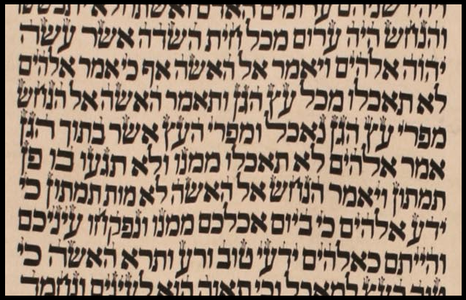
1 And the Whisperer was [more] naked than all the lives [of] the field which YHWH the Deity had made. And he said to the woman, “Furthermore, as the Deity said, ‘You shall not eat from every tree [of the] Garden.’”
2 And the woman said to the Whisperer, “From [the] fruit [of the] tree [of] the Garden we shall eat.
3 And from [the] fruit [of] the tree which is in the middle [of] the Garden, the Deity has said, ‘You shall not eat from it, and you shall not touch it, lest you shall die.’”
4 And the Whisperer said to the woman, “Dying you shall not die,
5 for the Deity knows, for in [the] day you shall eat from it, then shall be opened your eyes, and you shall be as deities, knowing good and evil.”
6 And the woman saw that the tree [was] good for food, and that [it was] lustful to the eyes, and a tree desirous for insight, then she took from its fruit, and ate, and gave also to her man with her, and he ate.
2 And the woman said to the Whisperer, “From [the] fruit [of the] tree [of] the Garden we shall eat.
3 And from [the] fruit [of] the tree which is in the middle [of] the Garden, the Deity has said, ‘You shall not eat from it, and you shall not touch it, lest you shall die.’”
4 And the Whisperer said to the woman, “Dying you shall not die,
5 for the Deity knows, for in [the] day you shall eat from it, then shall be opened your eyes, and you shall be as deities, knowing good and evil.”
6 And the woman saw that the tree [was] good for food, and that [it was] lustful to the eyes, and a tree desirous for insight, then she took from its fruit, and ate, and gave also to her man with her, and he ate.
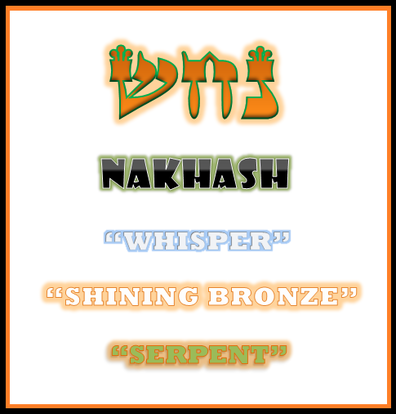
There are several issues in need of addressing in this passage. First is the choice I have made to render the Hebrew word usually found in most translations as “serpent” instead as “Whisperer.” The Hebrew term is NAKHASH, and while it most certainly can be translated to mean a serpent, the term in its most basic root concept is that of a “whisper” – a spoken word! Tradition would have us believe that a snake of some manner was speaking to the man and woman, but such an idea that the translator is limited to the creature only in how the word is rendered is not necessarily the case just from the information contained in the text itself. The ideas surrounding the Hebrew word NAKHASH here are that of “whispering,” as well as the color or metal of “shining bronze” – hence the later appellation of Satan in Isaiah 14:12 as HEYLEYL – the “Shining One,” or as we find in most English translations carrying over the Latin’s choice of “Lucifer.” In all honesty, the different alternate meanings of NAKHASH as “shining bronze” and as “serpent” are linked to “whisper” in the idea of the conveying of information – the metal as it was used in ancient Biblical societies as a mirror / reflector when polished, and the animal as viewed in many pagan ancient Middle Eastern societies as a divine vehicle for wisdom. The choice I have gone with in this passage of “Whisperer,” while admittedly very different than most English translations is based solidly on the root idea and the context of the passage wherein the entity is “speaking” with the man and the woman. This idea is important to keep in mind in this study, because it will bear further upon the temptation of Yeshua that will soon be addressed more fully.

The second detail worth noting is in regards to what is initially said to the woman by the Whisperer: if the reader is careful to note in the above English translation of 3:1, the conversation is “picked up on” with his initial words. Essentially, the Hebrew is allowing us to step into the middle of their conversation. This should not be viewed as the start of what they are talking about. Rather, the Hebrew is letting us know that they have been talking, and the reader is being dropped into their discussion without knowing what has already been said. However, it is what the Whisperer says to her that is recorded for us which is in need of pointing out. The Whisperer makes a statement that is factually incorrect about what the Holy One said to Adam. He twists the otherwise very direct Word of the Most High! This factor begins the terrifying sparring that begins man’s downfall.
The woman responds to the entity by attempting to correct his suggestion of what was actually said by the Creator. While her intent is pure, it seems, her presentation is flawed: she gives a paraphrase of what the Holy One said could and could not be done, and yet in that clarification in 3:2-3, she misquotes His words, as well, over-correcting the error of the satanic suggestion by offering her own added personal prohibition against the tree of the knowledge of good and evil. This misstep is where the Whisperer strikes like the serpent he is so often described to be.
He does not allow her time to edit her own misspoken addition, and neither offers to correct her error, but pushes onward and begins the blatant slander of the Holy One: they are being intentionally kept from the tree because eating of it will make them as one of the “deities” (a more proper translation as it is in the plural: think heavenly principalities or powers, as in the “us” the Creator mentions a few verses later in 3:22). The slander injects the venom of doubt into the woman’s otherwise faithful heart, and the damage is almost at once seen to be deadly. Emboldened by countenancing the Whisperer’s twisting of the spiritual decree of the Most High, her flesh succumbs to the desirable fruit, and she engages in the great apostasy of mankind, and the man who was with her and heard it all offering no word to contradict the Whisperer and guard the faith, or even protect the bride given him, falls away without a fight.
The woman responds to the entity by attempting to correct his suggestion of what was actually said by the Creator. While her intent is pure, it seems, her presentation is flawed: she gives a paraphrase of what the Holy One said could and could not be done, and yet in that clarification in 3:2-3, she misquotes His words, as well, over-correcting the error of the satanic suggestion by offering her own added personal prohibition against the tree of the knowledge of good and evil. This misstep is where the Whisperer strikes like the serpent he is so often described to be.
He does not allow her time to edit her own misspoken addition, and neither offers to correct her error, but pushes onward and begins the blatant slander of the Holy One: they are being intentionally kept from the tree because eating of it will make them as one of the “deities” (a more proper translation as it is in the plural: think heavenly principalities or powers, as in the “us” the Creator mentions a few verses later in 3:22). The slander injects the venom of doubt into the woman’s otherwise faithful heart, and the damage is almost at once seen to be deadly. Emboldened by countenancing the Whisperer’s twisting of the spiritual decree of the Most High, her flesh succumbs to the desirable fruit, and she engages in the great apostasy of mankind, and the man who was with her and heard it all offering no word to contradict the Whisperer and guard the faith, or even protect the bride given him, falls away without a fight.
Thus is the portrait of the temptation of the first Adam and his bride by the Enemy of all righteousness. His temptation towards mankind is in all manner of spectacle, but in truth, boils down to the methodology displayed in the passages quoted above. He tempts man in two ways: through appealing to the desires of the flesh, and by twisting the Word of the Holy One. Either method creates doubt in man – the wound that tears us away from trusting the One who made us and cares for us like no other. In these two ways the Enemy has tempted all peoples throughout all the ages of man. No other strategy has been needed: the flesh and spirit attack can fell a person untouched by sin, then how much more severe a blow it deals unguarded to a person born corrupted from Adam’s failure to withstand it? The importance of the account to our study is vital; correctly viewing it aides in properly appreciating the temptation of Messiah and His astonishing victory. The original temptation shows us details worth summarizing before going further:
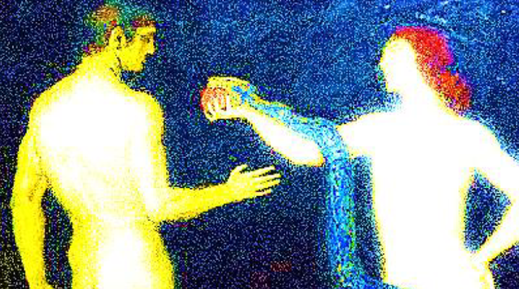
The Enemy is the Whisperer
The Whisperer perverts the Word previously given – a spiritual temptation
The Whisperer stoked the desires of the flesh with the fruit – a physical temptation
Mankind attempted to quote the Word – and failed to properly do so
The Whisperer perverts the Word previously given – a spiritual temptation
The Whisperer stoked the desires of the flesh with the fruit – a physical temptation
Mankind attempted to quote the Word – and failed to properly do so
With these concepts in place, let us turn to the New Covenant texts and view the account of the temptation of the second Adam – Yeshua. Scripture records for us the key moment in history in Messiah’s life where He was tempted. It is preserved in both the books of Matthew and Luke. The text of our primary focus will be that of Matthew, who was present as a student of Messiah and learned of these things straight from his Teacher, and then we shall turn to Luke for the supplementary information contained therein, as needed.
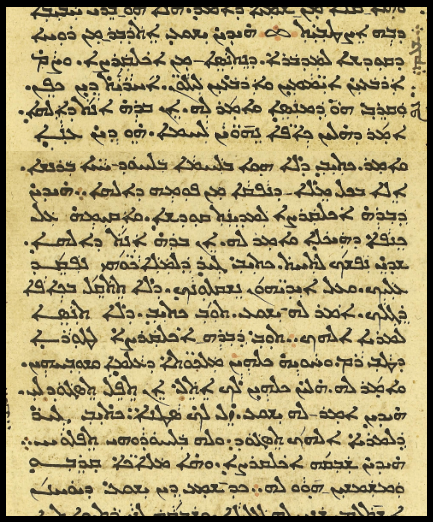
1 Then Yeshua was guided of the Spirit of Holiness into the wilderness, that He should be tempted of the Eater of Slander.
2 And He fasted forty days and forty nights; but at the last He hungered.
3 And he who was tempting Him drew near, and said to Him, “If You are the Son of the Deity, say that these stones should be bread!”
4 But He answered, and said, “It is written: ‘that not by bread alone does the son of man live, but instead, by every word that is coming forth from the mouth of the Deity.’”
5 Then the Eater of Slander guided Him to the holy city, and stood Him upon a wing of the Temple,
6 and said to Him, “If You are the Son of the Deity, cast Yourself below, for it is written: ‘His messengers He shall command concerning you, and upon their hands shall bear you, that upon a stone your foot is not struck.’”
7 Yeshua said to him, “It is further written: ‘You shall not tempt MarYa your Deity.’”
8 Again, the Eater of Slander guided Him to a mountain that was very high, and showed Him all the kingdoms of the world, and their glory,
9 and said to Him, “These all to You I shall give – if You shall fall to worship me.”
10 Then Yeshua said to him, “Do get yourself away, Satan!! For it is written: ‘MarYa your Deity you shall worship, and Him alone shall you serve!’”
11 Then the Eater of Slander left Him, and lo! messengers drew near, and they were ministering to Him.
2 And He fasted forty days and forty nights; but at the last He hungered.
3 And he who was tempting Him drew near, and said to Him, “If You are the Son of the Deity, say that these stones should be bread!”
4 But He answered, and said, “It is written: ‘that not by bread alone does the son of man live, but instead, by every word that is coming forth from the mouth of the Deity.’”
5 Then the Eater of Slander guided Him to the holy city, and stood Him upon a wing of the Temple,
6 and said to Him, “If You are the Son of the Deity, cast Yourself below, for it is written: ‘His messengers He shall command concerning you, and upon their hands shall bear you, that upon a stone your foot is not struck.’”
7 Yeshua said to him, “It is further written: ‘You shall not tempt MarYa your Deity.’”
8 Again, the Eater of Slander guided Him to a mountain that was very high, and showed Him all the kingdoms of the world, and their glory,
9 and said to Him, “These all to You I shall give – if You shall fall to worship me.”
10 Then Yeshua said to him, “Do get yourself away, Satan!! For it is written: ‘MarYa your Deity you shall worship, and Him alone shall you serve!’”
11 Then the Eater of Slander left Him, and lo! messengers drew near, and they were ministering to Him.

There are several issues here to discuss before diving into the temptation factor that will help us appreciate more what happened and why it happened. Notice how the text tells us in 4:1 that Messiah’s trip into the wilderness was not a fluke, but a spiritual journey taken only at the leading of the Holy Spirit. Messiah did not go forth of His own will, but allowed the Spirit to guide Him to this point in His life. Furthermore, notice that He was not taken into the Garden to be tempted. His temptation occurs in the wilderness! Why is it so different than the temptation of the first Adam? In Genesis 2:7-8 we find the information that connects the dots for us.
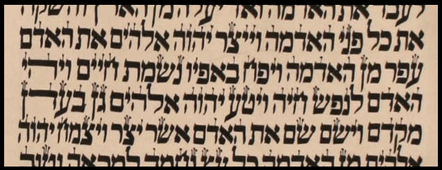
7 And YHWH the Deity formed the man [of] dust from the earth, and blew into his nostrils the breath of lives, and the man came to be a soul alive.
8 And YHWH the Deity planted a garden in Eyden, eastward, and there He placed the man which He formed.
8 And YHWH the Deity planted a garden in Eyden, eastward, and there He placed the man which He formed.

Adam was not made in the Garden of Eden. Man was created in the wild – in the untamed, unkempt world. Man did not initially find himself in the ordered and overseen Garden, but rather, drew his first breath and opened his eyes in the wilderness of the world! Ground untilled, rocky, and uncultivated surrounded him; a landscape of stone and unguided growth greeted his first moments. In this way, we see that there is a primeval link between the situation of Adam’s first awakening and that of Messiah’s calling into the wilderness.
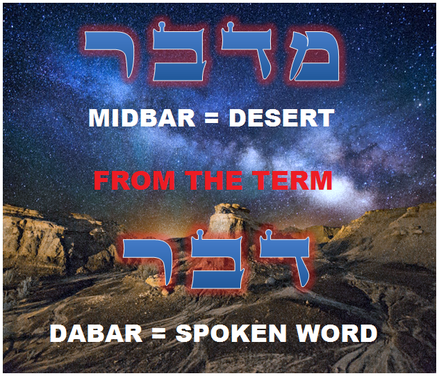
While Adam failed in the best possible environment, in the guarded panoramas of Eden, Messiah’s temptation would instead be in the most desperate and desolate of vistas: the safe harbor of Eden was long desiccated and gone – no paradise remained in the world for Him to repose in order to meet the temptation coming His way, and so to prove His calling, He would encounter tribulation in the wasteland. Furthermore, whereas Adam was given all fruit to eat in the Garden – save one – Messiah was prohibited food and taken to a place where scant any could be found. These contrasts reveal so much for those who have eyes to see.
There is yet a further detail in the choice of the Spirit to take Yeshua into the wilderness to face temptation. The Hebraic idea of “wilderness” itself holds the key for why this must be so: the word for “wilderness” in Hebrew is MIDBAR. The root concept behind MIDBAR is the Hebrew term DABAR, which means “spoken word.” The reality, then, is that the wilderness in Hebrew thought is actually a “Speaking Place.” When you say MIDBAR / “wilderness” in Hebrew, you are actually saying “Speaking Place.” If that seems strange to you at first thought, consider what happened to Israel when they were taken out of Egypt and the Spirit led them to Sinai, in the wilderness, where He spoke to them in Exodus 20 all His covenant words. Think of Elijah running in fear in 1st Kings 19:1-13, and he went into the wilderness (again to Sinai), where He heard the still, small voice. Think of the prophecy for the house of Israel in Hosea 2:14, where the Holy One proclaims that He will bring her into the wilderness, and speak to her heart to bring her to repentance. Many examples could be brought forth to show the link in the Hebraic thought of “wilderness” and “speaking.”
There is yet a further detail in the choice of the Spirit to take Yeshua into the wilderness to face temptation. The Hebraic idea of “wilderness” itself holds the key for why this must be so: the word for “wilderness” in Hebrew is MIDBAR. The root concept behind MIDBAR is the Hebrew term DABAR, which means “spoken word.” The reality, then, is that the wilderness in Hebrew thought is actually a “Speaking Place.” When you say MIDBAR / “wilderness” in Hebrew, you are actually saying “Speaking Place.” If that seems strange to you at first thought, consider what happened to Israel when they were taken out of Egypt and the Spirit led them to Sinai, in the wilderness, where He spoke to them in Exodus 20 all His covenant words. Think of Elijah running in fear in 1st Kings 19:1-13, and he went into the wilderness (again to Sinai), where He heard the still, small voice. Think of the prophecy for the house of Israel in Hosea 2:14, where the Holy One proclaims that He will bring her into the wilderness, and speak to her heart to bring her to repentance. Many examples could be brought forth to show the link in the Hebraic thought of “wilderness” and “speaking.”
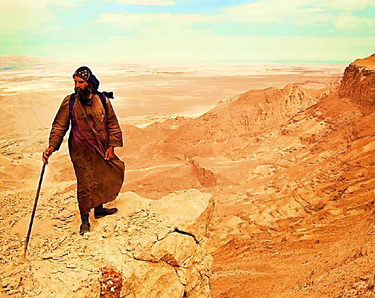
Adam’s creation was in the wilderness, too, in the “Speaking Place,” where we see recorded in Genesis 1:26 that the Holy One spoke over the creation of man the divine intent to make a living being after His own image. It was for his blessing that Adam was afterward taken to the mountain Garden in Eden, and where he was tempted by the Whisperer himself – thus showing that even the Garden was, in a way, a “speaking place,” for the words of the Enemy who whispered so strongly were heeded against the Words originally given there by the Holy One.
In contrast to this, we find that the Spirit takes Messiah into the wilderness, and in that “Speaking Place,” is confronted by the Whisperer in all his rage and deceit. The text tells us something here that we need to understand. The Spirit guided Messiah into the wilderness for the purpose of allowing the Enemy to tempt Him. The Aramaic title of Satan here is of interest – “Eater of Slander” – it is an attempt to describe his vile nature: he subsists off of slander – the defamation and misrepresentation of the Holy One. That has been his meat from the beginning of his fall, and so it is a fitting referent in Aramaic.
In contrast to this, we find that the Spirit takes Messiah into the wilderness, and in that “Speaking Place,” is confronted by the Whisperer in all his rage and deceit. The text tells us something here that we need to understand. The Spirit guided Messiah into the wilderness for the purpose of allowing the Enemy to tempt Him. The Aramaic title of Satan here is of interest – “Eater of Slander” – it is an attempt to describe his vile nature: he subsists off of slander – the defamation and misrepresentation of the Holy One. That has been his meat from the beginning of his fall, and so it is a fitting referent in Aramaic.

The Spirit knew exactly the intent of the Enemy and pushed the Son right into the path of perdition’s evil representative. It is important to carefully assess the temptations brought upon Him, because in doing so, we can see that what Scripture says in the Hebrews passage quoted originally is indeed true: in every way as us He too was tempted. It is not meant to be understood that He was tempted specifically with murder, or theft, or lying, or adultery, or whatever sin one may wish to insert into the list. The fact of the matter is that He was tempted in the precise same manner as the man and woman in Genesis chapter 3.
Consider the previously-mentioned method of the Enemy: he tempts man by appealing to the flesh, and he tempts man by twisting the divine decrees given for us to obey. Those two attacks are his only weapon needed to subjugate all mankind under his tyrannical rule. We see in the text of Matthew chapter 4 that it is exactly that same method the Enemy brings against Yeshua in the wilderness.
Consider the previously-mentioned method of the Enemy: he tempts man by appealing to the flesh, and he tempts man by twisting the divine decrees given for us to obey. Those two attacks are his only weapon needed to subjugate all mankind under his tyrannical rule. We see in the text of Matthew chapter 4 that it is exactly that same method the Enemy brings against Yeshua in the wilderness.
The first temptation shown in Matthew 4:2-4 is towards Yeshua’s fleshly desires. He had fasted forty days, and His hunger was as real a factor in His body as anything could be. The power existed at His fingertips to rearrange atomic structures in the stones and make from them edible bread to fill his achingly empty stomach. The temptation is all predicated on one single word: “if…” If Messiah is the Son of the Holy One, then such a task is without any trouble. The kernel of doubt is present in the fleshly temptation just as it existed in the temptation doled out to the first man and woman. There is no difference.

2 And He fasted forty days and forty nights; but at the last He hungered.
3 And he who was tempting Him drew near, and said to Him, “If You are the Son of the Deity, say that these stones should be bread!”
4 But He answered, and said, “It is written: ‘that not by bread alone does the son of man live, but instead, by every word that is coming forth from the mouth of the Deity.’”
Messiah’s response to the Eater of Slander is vital for us to appreciate. He did not speak His own words, nor did He add to the Words of the Most High, as we saw happened in the first temptation. Rather, He uttered divine words right back at the Enemy: the Torah itself came forth from His mouth as a sword that cut down the temptation of His flesh! Messiah quotes Deuteronomy 8:3 to the devil, revealing that the flesh must be obedient to the dictums of the Spirit. Man must hang on every word spoken by the Creator, and in so doing, the flesh will be sustained no matter the situation, for the obedience equals life in the realm of the Spirit.
The second temptation the Enemy lashes out with against Yeshua is a spiritual temptation – twisting the words of the Holy One. He begins the temptation with a unique action: taking Messiah to Jerusalem and upon a lofty perch on the Temple. Surrounded by the “safe” space of the Temple, close to the Presence of the Holy One, with the sounds of the animals being led to sacrifice and the crescendos of those singers and musicians offering praise that He could surely hear below, it must have been a peculiar experience.
The second temptation the Enemy lashes out with against Yeshua is a spiritual temptation – twisting the words of the Holy One. He begins the temptation with a unique action: taking Messiah to Jerusalem and upon a lofty perch on the Temple. Surrounded by the “safe” space of the Temple, close to the Presence of the Holy One, with the sounds of the animals being led to sacrifice and the crescendos of those singers and musicians offering praise that He could surely hear below, it must have been a peculiar experience.
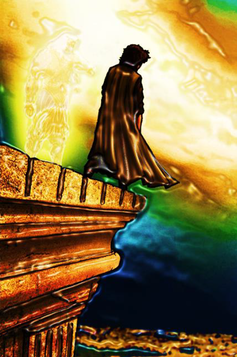
5 Then the Eater of Slander guided Him to the holy city, and stood Him upon a wing of the Temple,
6 and said to Him, “If You are the Son of the Deity, cast Yourself below, for it is written: ‘His messengers He shall command concerning you, and upon their hands shall bear you, that upon a stone your foot is not struck.’”
7 Yeshua said to him, “It is further written: ‘You shall not tempt MarYa your Deity.’”

He stood there with the Enemy of mankind and was given the temptation to descend to the Temple courtyard below in a show of power and “faith” in the Word of the Most High. That suggestion was rooted in perversion, however. The Enemy showed again as he did in the Garden that he could quote the words of the Creator, but in a twisted manner. While in the Garden He twisted the words literally, adding in a prohibition not originating in the mind of the Holy One, here the Enemy quotes a valid text of Scripture without twisting the preserved text itself, which comes from Psalm 91:11-12. What he does do, in deceit, is attempt to interpret the intent of the Word in that instance to be something it is not.
Messiah’s reply is to once again strike back with the spiritual sword of the Torah by quoting Deuteronomy 6:16. Yeshua’s recourse is not to pray away the Enemy, but to confront without backing down the evil in His midst. He returns blows with the Word, giving a text from the Torah that cuts right to the core of what the Eater of Slander was attempting to do: tempt the Son to necessitate the Most High to save Him when He would otherwise not be in any need of rescuing. The Enemy’s tactic of twisting the Word to his devices is immediately seen for what it is by the Messiah, and so we find the Son in triumph when it comes to the manner in which the ancient Whisperer, the Eater of Slander, would tempt mankind.
Messiah’s reply is to once again strike back with the spiritual sword of the Torah by quoting Deuteronomy 6:16. Yeshua’s recourse is not to pray away the Enemy, but to confront without backing down the evil in His midst. He returns blows with the Word, giving a text from the Torah that cuts right to the core of what the Eater of Slander was attempting to do: tempt the Son to necessitate the Most High to save Him when He would otherwise not be in any need of rescuing. The Enemy’s tactic of twisting the Word to his devices is immediately seen for what it is by the Messiah, and so we find the Son in triumph when it comes to the manner in which the ancient Whisperer, the Eater of Slander, would tempt mankind.
Every single time the Enemy had ever tempted a human, he had employed one of the two methods shown to have brought Adam to his knees in idolatry: tempting with the desires of the flesh, and tempting with twisting the intended desire of the Holy One for His people. While they came in many veiled forms, all temptation to man has consisted of exactly those two methods. None more were needed, because the best of them had fallen at the beginning, and so all others would naturally break under the same temptation.
Now, however, everything had changed. This new “Adam,” Yeshua, had overturned all the rules. He had taken the playbook of the Enemy and ripped it to shreds, essentially. The Enemy had railed upon Him in His time of greatest need, and had spoken the Word without blemish for the first time in the history of Scripture in attempt to deceive, and Yeshua came out on the other side of that darkness victorious – resisting the pressure upon Him to give in. For the first time in all of history the Enemy faced a Man who was not under his absolute control. For the first time since the Garden, the Whisperer was beholding the Image of the Creator unmarred, and unflinching in the face of his vile attacks. All temptation that could be laid forth was bound up in the flesh and in the spirit, and Messiah had utilized the Torah of the Holy One to sufficiently and hastily combat those tests. What more could be done?
As the reader well knows, the Eater of Slander does offer a third and final temptation to Yeshua. In Matthew 4:8-9, he presents the unbelievable: the world is offered back entire to the Son of the Holy One!
Now, however, everything had changed. This new “Adam,” Yeshua, had overturned all the rules. He had taken the playbook of the Enemy and ripped it to shreds, essentially. The Enemy had railed upon Him in His time of greatest need, and had spoken the Word without blemish for the first time in the history of Scripture in attempt to deceive, and Yeshua came out on the other side of that darkness victorious – resisting the pressure upon Him to give in. For the first time in all of history the Enemy faced a Man who was not under his absolute control. For the first time since the Garden, the Whisperer was beholding the Image of the Creator unmarred, and unflinching in the face of his vile attacks. All temptation that could be laid forth was bound up in the flesh and in the spirit, and Messiah had utilized the Torah of the Holy One to sufficiently and hastily combat those tests. What more could be done?
As the reader well knows, the Eater of Slander does offer a third and final temptation to Yeshua. In Matthew 4:8-9, he presents the unbelievable: the world is offered back entire to the Son of the Holy One!
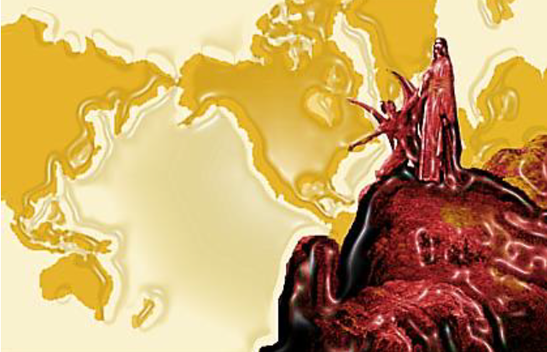
8 Again, the Eater of Slander guided Him to a mountain that was very high, and showed Him all the kingdoms of the world, and their glory,
9 and said to Him, “These all to You I shall give – if You shall fall to worship me.”
9 and said to Him, “These all to You I shall give – if You shall fall to worship me.”
It must be said that it is not a lie. He had the right to offer this grand creation back to the Messiah, for so he makes it clear in the extra detail provided by the account in Luke 4:6-7.
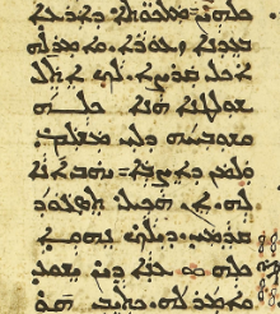
6 And the Eater of Slander said to Him, “To You I shall give all this authority, and the glory of it, which was delivered to me, and to whom I so desire I give it to him.
7 If, therefore, You shall worship before me – the entirety shall be Your own!”

Let the reader understand his offer is valid, and in that validity is the key detail of the sheer terror and panic that must have filled Satan’s dark heart. Ever since Adam, the Enemy had laid claim to the world and its worth. He had rightly laid coup to the Kingdom by stealing the adoration of Adam, a feat which earned him the earth entire. All nations were under his sway, and the hearts of man were bound to his dark desires. He could, and he did, give it to whomever he desired. His words were as legitimate as could be, and knowing this shows us how desperate and terrified he truly was at the knowledge that he held no control over Yeshua.
Yeshua stood opposed to him in determined obedience to the calling of the Holy One, a man with undiluted fidelity flowing through His veins, and resisted with all His willpower the temptations that had felled every man before Him. He had proven to all principalities and powers that nothing stood in His way from earning back the creation that had been taken from His Father’s Image-Bearers so long before. The Enemy had nothing left to ensnare the Son, save for the panicked and last ditch effort to offer it all back to the Second Adam. Everything for which the Enemy had worked he was willing to give up, so long as Messiah would worship him as deity. He was willing to let it all go, to allow the creation to be in another’s hands for the first time since he so masterfully took it. It was a move birthed in his madness, and Yeshua’s final temptation.
Think about what it must have meant for Yeshua: His purpose, His divine calling was to retake the world, to reclaim creation and sit as King over it. He knew the horror of what was determined for Him – the hardships He would face, the lack of faith in people, the resistance of the religious elite, the rejection by His own tribe, the torture that would come, the hellish execution He would undergo… None of that would be lost on Yeshua in the wake of the final temptation to forgo all of that and take His throne now, if only He would bow.
Yeshua stood opposed to him in determined obedience to the calling of the Holy One, a man with undiluted fidelity flowing through His veins, and resisted with all His willpower the temptations that had felled every man before Him. He had proven to all principalities and powers that nothing stood in His way from earning back the creation that had been taken from His Father’s Image-Bearers so long before. The Enemy had nothing left to ensnare the Son, save for the panicked and last ditch effort to offer it all back to the Second Adam. Everything for which the Enemy had worked he was willing to give up, so long as Messiah would worship him as deity. He was willing to let it all go, to allow the creation to be in another’s hands for the first time since he so masterfully took it. It was a move birthed in his madness, and Yeshua’s final temptation.
Think about what it must have meant for Yeshua: His purpose, His divine calling was to retake the world, to reclaim creation and sit as King over it. He knew the horror of what was determined for Him – the hardships He would face, the lack of faith in people, the resistance of the religious elite, the rejection by His own tribe, the torture that would come, the hellish execution He would undergo… None of that would be lost on Yeshua in the wake of the final temptation to forgo all of that and take His throne now, if only He would bow.
The reply of Messiah is beautiful! Matthew 4:10-11 gives us the end of the matter.
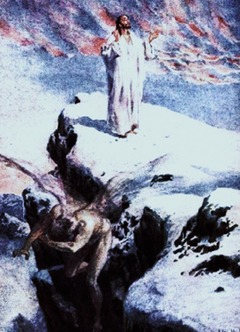
10 Then Yeshua said to him, “Do get yourself away, Satan!! For it is written: ‘MarYa your Deity you shall worship, and Him alone shall you serve!’”
11 Then the Eater of Slander left Him, and lo! messengers drew near, and they were ministering to Him.
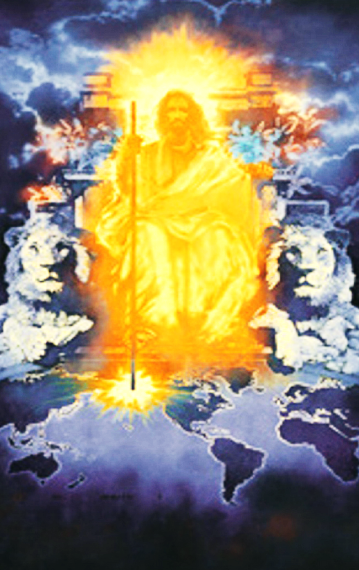
Yeshua stood firm, unwavering in His fealty to the Father. He unleashed a final blow against the vile Whisperer, one last strike from the Torah’s book of Deuteronomy 6:13. The heart of Yeshua beat uninterrupted for the things of the Father.
Yes, He would face a difficult ministry.
Yes, He would see the lack of faith and be troubled in heart.
Yes, He would know rejection from His brothers in the tribe of Judah.
Yes, He would feel the pain of torture.
Yes, He would be sent to a sadistic execution.
To do the will of the Holy One, He would endure all of that without flinching in the face of temptation. To restore the loss of the first Adam, the second Adam would persevere against temptation and reclaim the creation and those intended to be its heirs. He commanded the Enemy to leave Him, and the Enemy, likely more distraught than he ever had been in his existence, fled from the presence of the One human who dared to resist all his offers, and who would one day be responsible for his destruction.
Yes, He would face a difficult ministry.
Yes, He would see the lack of faith and be troubled in heart.
Yes, He would know rejection from His brothers in the tribe of Judah.
Yes, He would feel the pain of torture.
Yes, He would be sent to a sadistic execution.
To do the will of the Holy One, He would endure all of that without flinching in the face of temptation. To restore the loss of the first Adam, the second Adam would persevere against temptation and reclaim the creation and those intended to be its heirs. He commanded the Enemy to leave Him, and the Enemy, likely more distraught than he ever had been in his existence, fled from the presence of the One human who dared to resist all his offers, and who would one day be responsible for his destruction.
The hope given to man in moments of our own temptation is not that we can endure at all times, but that we proclaim as King the One who, at all times, endured the lure of temptation and came out victorious for us. He is our reminder when we fail that this broken world will be restored by His own determined victory won from an earthly life that refused to give in to sin. By His flawless obedience in the face of temptation, Yeshua has earned the right to sit on the throne of the earth and be hailed by all as the King of Kings!
All study contents Copyright Jeremy Chance Springfield, except for graphics and images, which are Copyright their respective creators.